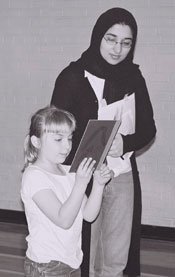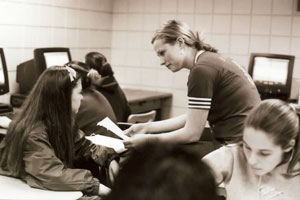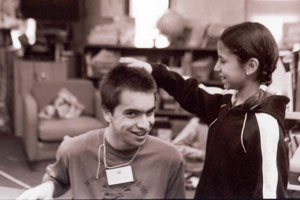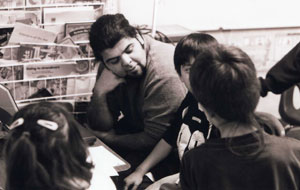 |
|||||||||
| Undergraduate Academic Affairs Home | News | Make a Gift | UW Alumni | |||||||||
|
April 2010 | Return to issue home
Pipeline Project's Alternative Spring Break to Expand Spring break 2010 marked the 10th anniversary of the Pipeline Project’s Alternative Spring Break during which UW students lead arts and literacy or environmental projects in K-12 classrooms in rural and tribal communities across Washington state.
What started with 22 students volunteering at four sites in 2001 has grown to 50 students working at 31 sites. By living and working in these communities, UW students develop deeper understandings of the challenges and joys of rural and tribal life. For K-12 students, connecting with UW students can affirm or spark their own educational goals. For both sets of students, the experience can be transformational. Now, thanks to a gift from Alyson McGregor, '83, the Pipeline Project is taking the first step to expand this program beyond spring break week. Working closely with Neah Bay Elementary School, a participating site since 2002, Pipeline is developing the program "More Than the Middle of Nowhere: Exploring Social Justice in Rural Washington." Starting in the fall with a two-week seminar focusing on issues of equality and access in secondary education and youth support networks, students will take their knowledge, ideas and questions out to Neah Bay. In a two-week visit, each UW student will be paired with two to three elementary students, to promote achievement and awareness of educational issues. Following their field experience, UW project participants will maintain relationships with Neah Bay students through e-mail and an interactive Web site, and they will all reconnect in person during Alternative Spring Break (ASB). Alice Murner, the principal of Neah Bay Elementary School, has participated in ASB since her first year as principal. "Writing projects with the kids was my initial interest in the program. Our students get to go through the writing process and learn to love to write. I also hope they gain the impression that higher education is a good thing and something they can pursue." As for the experience of the UW students, “I hope that while working with small groups of students they will learn that this is why they want to be a teacher, and that the students of Neah Bay Elementary School hold a strong connection to their culture and are very proud.”
Monika Jones, '04, participated in Arts & Literacy ASB in 2002 and 2003 and planned ASB for 2004. Her first two ASBs were with middle school students in Brewster, Wash., so in 2004 she went to the Quileute Tribal School in La Push, Wash., to work with younger students. "It was really fun. Their stories were so energetic. I later was a kindergarten classroom teacher for a year and they had that same boundless enthusiasm. As a teacher I designed a project around bookmaking and science. This was really cool—to be able to use what I'd learned through ASB in another classroom project. Around the world, no matter what the age, really, people love making their own books." Working toward a Ph.D. in gender studies and communications theory at Central European University in Budapest, Hungary, Monika reflects, "Doing ASB and then later volunteering in the Seattle school system gave me a chance to see what teaching language in classrooms was really like."
Zach Savich, '04, participated in Arts & Literacy ASB in 2002 and 2003, and is now in graduate school at the University of Massachusetts–Amherst, and a creative writing teacher. "Alternative Spring Break gave me the chance to connect with other smart and lively college students and combine creative thinking with rigorous academic thinking." He also appreciated the chance to see academics combining with the real world in the small groups in the classroom, "I learned to see how students can respond in ways that surprise you."
Currently an academic counselor in the UW’s Office of Minority Affairs and Diversity, Vincent Gonzalez, '06, credits ASB with his passion for a career in education and his definition of exploration. "Alternative Spring Break expands your experience beyond the UW campus and the city of Seattle. You don’t have to leave the country to explore the world. You can drive five hours and be in a completely different place." As for the next 10 years of ASB? "The goal for ASB has been to create a broader and deeper experience. We hope to raise enough support to expand this project to an additional site in Eastern Washington next year, and eventually provide this level of programming at all sites," shares Christine Stickler, '87, director of the Pipeline Project. Get more information about Alternative Spring Break or make a gift. April 2010 | Return to issue home | |||||||||
|
|||||||||



